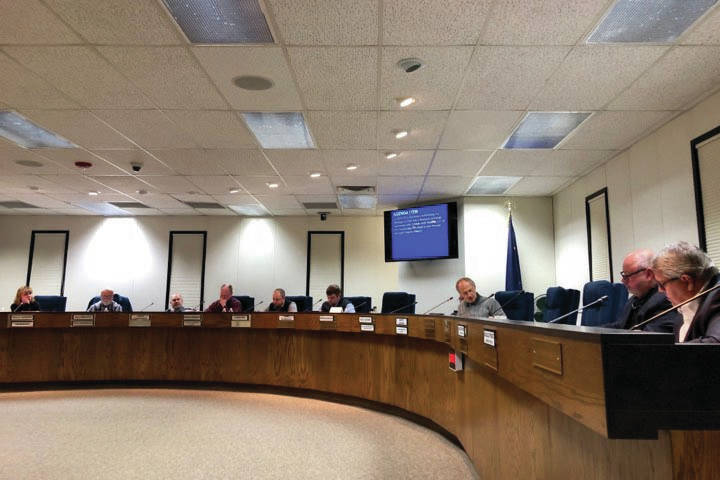The Kenai Peninsula Borough Assembly chose not to reconsider code changes affecting gravel pit operators at its Tuesday meeting. The code-changing ordinance, voted down at the Dec. 3 assembly meeting, was brought to Tuesday’s meeting for reconsideration by assembly member Jesse Bjorkman.
Bjorkman said he asked the ordinance be reconsidered after members of the public contacted him with the hope of offering input on the ordinance.
“I think reconsideration will go a long way to informing and educating people about that process as well as potential changes to proposed ordinances and ordinances moving forward having to do with gravel pits and material sites,” Bjorkman said at Tuesday’s meeting.
Assembly member Brent Johnson also supported reconsideration of the ordinance, saying that it included a number of housekeeping items that weren’t controversial.
Assembly member Hal Smalley said he agreed the ordinance had good, necessary components, but that the planning department should continue to tinker with the ordinance and bring it back to the assembly.
The planning department has 60 days to bring forth a new ordinance.
Assembly member Norm Blakeley also did not support reconsideration and said that numerous residents contacted him about the ordinance with nothing “good to say about it.”
The reconsideration failed 5-4, with assembly members Bjorkman, Willy Dunne, Johnson and Tyson Cox voting in favor.
Since reconsideration failed and was removed from the agenda, there was no immediate opportunity for public comment. After the vote, more than a dozen members of the public who came to speak on the ordinance and its reconsideration left the meeting.
Bjorkman said the lack of an immediate public comment period following the reconsideration vote was “not a win” for the assembly or the public process.
“When we have a room full of people and all of them leave before they have the opportunity to get up and testify, I’m not sure that’s a great measure of progress,” Bjorkman said. “I’m not sure that’s a win for the assembly or a win for public policy when people show up to this chamber and they aren’t given a timely opportunity to talk about what they came here to talk about.”
Cooper said that while the lack of public testimony might have seemed “cold,” she supported the borough’s process for public notice.
“When we want people to be involved in this process,” Cooper said. “If we don’t have what’s lined up on what’s going to happen and when it’s going to happen, people who showed up here tonight — typically we wouldn’t even have a public hearing but I gave notice there would be a public hearing if it was reconsidered — but had we on the fly changed that, we haven’t given public notice. So the only people who would have had the advantage are the people here in the room. The people who thought they understood the process would not have had the opportunity to participate.”
Changes to material site code, including permits, applications, conditions and procedures, were first introduced in an ordinance at the Nov. 5 borough assembly meeting.
The ordinance highlights a number of changes, including more detailed definitions throughout the material site code, increasing groundwater testing, increasing the buffer from water bodies to 200 feet, decreasing the number of hours operators can process and crush rocks, new sound level conditions and a new white noise alarm requirement, among others.
Several of the proposed code changes were first explored in the borough’s Material Site Workgroup, established in 2018 to engage in collaborative discussion involving the public and industry to make recommendations regarding the material site code, according to the ordinance.
The work group explored recommendations for nearly two years, and discussions were long and emotional, assembly member and former work group member Brent Johnson said at December’s assembly meeting.
Assembly President Kelly Cooper brought up the work done on the ordinance by the work group, saying the ordinance “was not a rushed item.” Cooper, who voted against reconsideration, said any potential amendments to the ordinance are “beefy” and large enough to warrant some restructuring of the ordinance.
“There were many items in it that were good — many housekeeping items,” Cooper said.
The proposed ordinance takes into account comments from the community expressing concerns about gravel pits, including dust, noise and aesthetics.
“The planning department received numerous complaints regarding unreclaimed parcels registered as non conforming prior existing material sites which have not been regulated by KPB,” the ordinance said. “Certain additional conditions placed on material site permits would facilitate a reduction in the negative secondary impacts of material sites, e.g. dust, noise, and unsightliness of material sites.”
At the Dec. 3 meeting, the assembly voted down the ordinance 6-3, with assembly members Kelly Cooper, Willy Dunne and Brent Johnson supporting the ordinance’s passage. At the end of the assembly meeting, however, assembly member Jesse Bjorkman moved to have the ordinance reconsidered at the next meeting.
There are hundreds of material sites, including gravel pits, across the peninsula.
At their Nov. 12 meeting, the Kenai Peninsula Borough Planning Commission reviewed the proposed ordinance and recommended it unanimously along with a handful of amendments.

